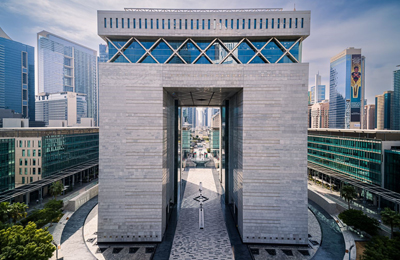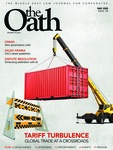DIFC Courts strengthens reputation as region’s ‘safe harbour’ for maturing dispute resolution

The Dubai International Financial Centre (DIFC) Courts today released its annual figures for the full year of 2021, with total a volume of 747 cases across all divisions.
The main Court of First Instance (CFI) recorded 147 cases, with a total case value of AED 3.8 billion and average case value of AED 46.7 million, which also includes the Technology & Construction Division (TCD) and Arbitration Division (ARB) cases.
Reinforcing the Courts’ record of certainty for business through enforceable judgments, the total value of enforcement claims filed amounted to AED 2.3 billion in 2021, an increase of 108% year-on-year, with 239 enforcement cases recorded.
Cases brought before the CFI covered a range of sectors including banking and finance, construction, technology, and real estate, and involved disputes related to breach of contract, insolvency, arbitration agreements, employment, and public international law. There was also a noticeable increase in the number of opt-in cases in 2021, with 50% of claims in the CFI originating from parties electing to use the DIFC Courts to resolve their disputes.
The Small Claims Tribunal (SCT) recorded 361 cases in 2021, with 65% of claims in the SCT originating from parties electing to use the DIFC Courts to resolve their disputes. Cases were driven primarily by breach of contract, which represented 62% of all cases in 2021, followed by employment (22%), property and tenancy (13%), and banking & finance (3%). Underlining the SCT’s increasing popularity for SME-related dispute resolution, the total value of claims recorded in 2021 was AED 36.9 million, with an average case value of AED 106,000.
Zaki Azmi, chief Jjustice, DIFC Courts, said,“We continue our mission to generate the best from litigation, arbitration, and mediation to provide a new, more modern set of procedures for resolving disputes. The DIFC Courts has led with the necessity to develop not just an institution to hear cases, but also to contribute to the style and manner in which the court user journey is synthesised. Our dedication to enhancing the user experience is strengthened by adopting smart technologies, automated processes, and state-of-the-art courtroom communications equipment. This has also played a key role in supporting the increasing international caseload.”
Awareness of the DIFC Courts services was also bolstered by cooperation agreements signed in 2021. The DIFC Courts continued to strengthen its partner ecosystem and signed several memoranda with entities across the public and private sectors, as well as with academic institutions, including, Ajman Media City Free Zone (AMCFZ), Ajman Chamber of Commerce and Industry (ACCI), Emaar Properties, Dubai World Trade Centre Authority (DWTCA), Umm Al Quwain (UAQ) Chamber of Commerce and Industry, and the American University in the Emirates (AUE).
His Excellency Justice Omar Al Mheiri, director, DIFC Courts, said, “Whilst the DIFC Courts has developed a directive to absorb the maturing needs of the regional legal community, the original and purest foundational mandate still remains; to promote Dubai and the UAE’s geographic position in the Gulf as a significant strategic advantage for international investors – a gateway bridging those working in South and East Asia, the Middle East, Europe, Africa, and the western hemisphere. The reputation of DIFC Courts as a safe harbour and business gateway continues to mature. The increasingly international nature of our caseload is a clear signal that international businesses with interests in the Middle East region consider the DIFC Courts to be their first choice for dispute resolution, fulfilling the vision of His Highness Sheikh Mohammed Bin Rashid Al Maktoum, UAE Vice President and Prime Minister and Ruler of Dubai, to establish the city as a global hub for business.”

























































































































